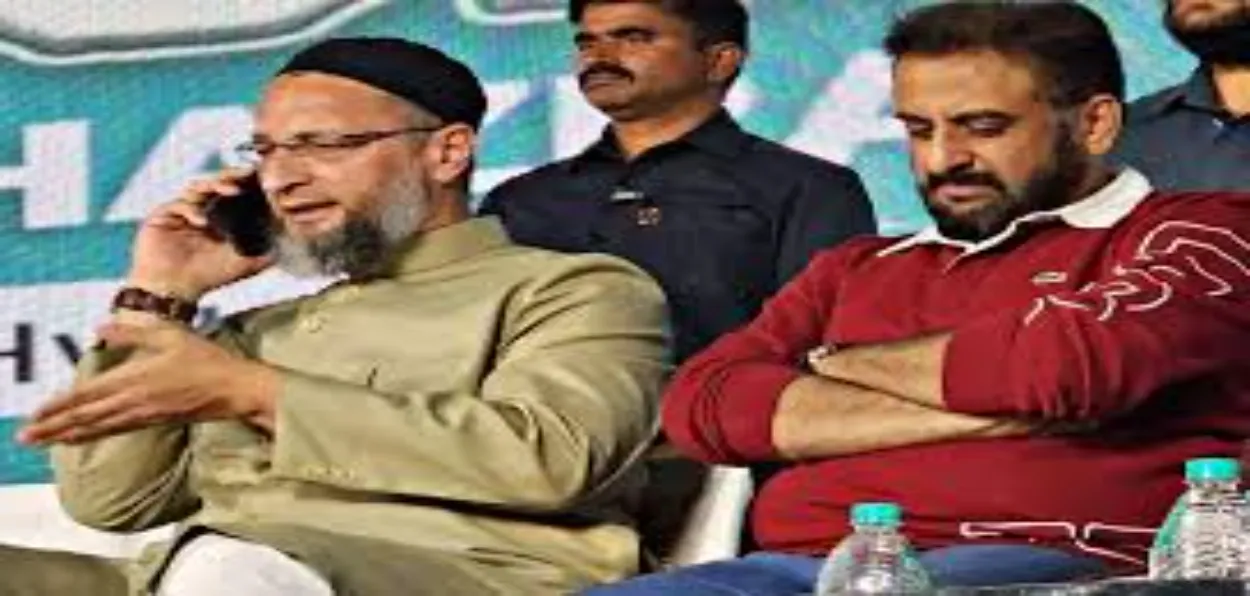
Shahebaz M. Farooq Maniyar
The All India Majlis-e-Ittehad-ul-Muslimeen (AIMIM), originally founded in 1927 as "Majlis-e-Ittehad-ul-Muslimeen" (MIM), was established under the leadership of Nawab Mahmud Nawaz Khan Qiledar in Hyderabad. After the Hyderabad princely state's integration into India, the party was revived in 1958 by Abdul Wahed Owaisi, who renamed it AIMIM.
After Wahed Owaisi, his son Sultan Salahuddin Owaisi took the reins, followed by its current president and MP, Asaduddin Owaisi, Sultan Salahuddin's son.
AIMIM's political ideology primarily focuses on Muslim issues. While the party was originally limited to Hyderabad's Old City, it expanded into other states under Asaduddin Owaisi's leadership.
AIMIM entered Maharashtra politics during the 2012 Nanded Municipal Corporation elections, winning 11 seats. In the 2014 Maharashtra Assembly elections, AIMIM made a strong debut, winning two seats: Imtiaz Jaleel from Aurangabad Central and Waris Pathan from Byculla.
The party continued to gain ground, winning municipal seats in cities like Aurangabad, Mumbai, Nanded, Solapur, Amravati, and Dhule. In 2019, AIMIM allied with the Vanchit Bahujan Aghadi (VBA), resulting in Imtiaz Jaleel winning the Aurangabad Lok Sabha seat. That same year, it won two assembly seats: Farooq Shah from Dhule City and Mufti Ismail Qasmi from Malegaon.
Decline in Influence
However, AIMIM’s success in Maharashtra has not been sustained. The party’s performance has dwindled over time, exposing weaknesses in its strategies. For instance, in Nanded, where AIMIM first gained prominence in 2012, it failed to win even a single corporator seat in the 2017 municipal elections. Similarly, AIMIM lost its 2014 assembly seats—Aurangabad Central and Byculla—in 2019. By 2024, it had also lost the Aurangabad Lok Sabha and Dhule City assembly seats.
Despite fielding 16 candidates in the 2024 Maharashtra Assembly elections, AIMIM won only one seat, Malegaon Central, by a narrow margin of 162 votes. This pattern highlights the party's struggle to regain its foothold in Maharashtra's political landscape.
Factors behind AIMIM’s decline
While Muslims constitute 11.5% of Maharashtra's population, the state has very few Muslim-majority constituencies. Only five constituencies—Malegaon Central (80%), Shivajinagar-Mankhurd (53%), Bhiwandi East (51%), Mumbadevi (50%), and Bhiwandi West (50%)—have over 50% Muslim voters.
In Telangana, AIMIM thrives in Hyderabad's Old City, which has a higher concentration of Muslim-majority constituencies. Maharashtra, in contrast, offers a less favorable demographic landscape for AIMIM’s strategy, making it difficult to rely solely on Muslim votes for electoral success.
Polarization of Hindu votes
AIMIM’s politics often relied on Muslim vote consolidation. However, this approach has triggered counter-polarization of Hindu votes in several constituencies, leading to AIMIM's defeat.
For example:
In Aurangabad Central, Imtiaz Jaleel won in 2014 due to a split between Shiv Sena and BJP votes. However, in 2019 and 2024, increased Hindu vote consolidation against AIMIM led to the defeat of AIMIM candidate Naseer Siddiqui.
In Byculla, Waris Pathan won in 2014 due to a divided opposition but lost in subsequent elections due to consolidated Hindu votes.
Similarly, in Dhule City, Farooq Shah won in 2019 but lost in 2024 despite an increase in AIMIM’s vote share due to Hindu vote polarization.
Weak Party Organization
AIMIM failed to capitalize on its initial success in Maharashtra by building a strong organizational structure. The party lacks active branches at the state, district, and taluka levels, and key appointments are often delayed. Critics argue that Imtiaz Jaleel, as the state president, focused solely on Aurangabad, neglecting broader organizational development.
Without a cadre of trained party workers or well-defined policies, AIMIM has struggled to sustain its growth. The party’s reliance on the Owaisi brothers’ emotional speeches has proven insufficient for long-term political success.
Personality-Centric Politics
In Maharashtra, AIMIM’s politics revolves around individual leaders in specific regions, such as Imtiaz Jaleel in Aurangabad, Waris Pathan in Mumbai, and Mufti Ismail in Malegaon. This over-dependence on individual figures has limited the party’s expansion and made it vulnerable to electoral setbacks.
Disillusionment Among Supporters
Several prominent Muslim activists and intellectuals, who initially joined AIMIM with high expectations, have since left the party, citing unfulfilled promises. For instance, Javed Pasha Qureshi, a scholar and former state spokesperson, resigned after being sidelined. Similarly, activists like Anjum Inamdar (Pune), Mohsin Khan (Latur), and Ramiz Sheikh (Ambajogai) distanced themselves from AIMIM due to dissatisfaction with its functioning.
The "Ekla Chalo Re" Approach
In an era dominated by alliances, AIMIM’s refusal to collaborate with other parties has hindered its growth. While its 2019 alliance with the VBA resulted in Imtiaz Jaleel’s Lok Sabha victory, the partnership dissolved soon after. AIMIM’s insistence on contesting elections alone has limited its influence and contributed to its declining vote share.
The Road Ahead
For AIMIM to remain relevant in Maharashtra politics, it must undergo significant reforms:
ALSO READ: Maharashtra Muslims have expectations of fair play from Fadnavis government
AIMIM’s decline in Maharashtra underscores the need for introspection and change. Relying solely on Muslim votes is unsustainable. Without strategic alliances and organizational reforms, the party risks becoming irrelevant in the state’s dynamic political landscape.
(The author is a Senior Research Scholar in the Department of Political Science and Civics at the University of Mumbai.)
